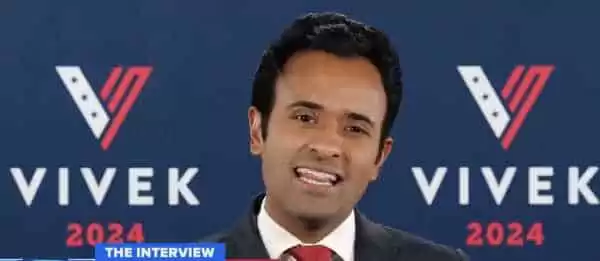Big Pharma Guru Vivek Ramaswamy Discusses with Tucker
Vivek Ramaswamy, a young presidential candidate, is gaining popularity but faces criticism for his ties to Big Pharma and China.
Vivek Ramaswamy, a notable figure in the political landscape, has made headlines as the youngest person ever to run for the positions of president, vice president, or Manchurian Candidate. While I personally support Donald Trump and may not be invested in Ramaswamy's candidacy, it is worth noting that he recently appeared in an interview with Tucker Carlson, which you can watch in the clip provided below.
In the realm of public opinion, Ramaswamy has gained traction, surpassing Ron DeSantis in the polls with a significant lead of 13% to 8%. This success can be attributed to his exceptional salesmanship and ability to articulate his ideas effectively, which is something DeSantis has struggled with. It is worth mentioning that Ramaswamy seems to be influenced by his establishment donors, shaping his stance on various issues.
Critics often label Ramaswamy as a "Big Pharma shill," suggesting that he avoids discussing topics related to COVID due to his ties to the pharmaceutical industry. However, it is interesting to note that he recently expressed support for the legalization of hard drugs as a means to help individuals overcome their addictions, citing San Francisco as an example. Additionally, Ramaswamy is a strong advocate for mRNA technology, highlighting his deep connections to the pharmaceutical sector, including his role in founding Roivant and his involvement with Soivant, which has ties to China.
Jordan Schachtel, a prominent commentator, praises Ramaswamy for his stance against ESG (Environmental, Social, and Governance) and DEI (Diversity, Equity, and Inclusion) initiatives, as well as his skepticism towards the climate change narrative and woke ideology. However, Schachtel also raises concerns about Ramaswamy's association with George Soros, urging him to provide a clear explanation for this longstanding connection.
Interestingly, Ramaswamy's Wikipedia page underwent recent changes that removed information regarding his religion and his association with Soros, Inc. The motives behind these edits remain unknown.
In a thought-provoking piece for the Wall Street Journal in 2020, Ramaswamy launched a scathing critique of the World Economic Forum (WEF) and BlackRock's "stakeholder capitalism" model. However, he seemingly contradicted himself by expressing a desire to have BlackRock as a shareholder if his company ever goes public.
Adding to the complexity surrounding Ramaswamy's background, he was a featured speaker at a Shanghai investment conference in 2018. Furthermore, he has established companies in China and formed partnerships with Chinese firms. One notable collaboration involved Roivant joining forces with the CIVIC Group, a state-owned investment company of the Chinese government, to launch Sinovant Sciences.
In conclusion, Vivek Ramaswamy's political journey is one that sparks intrigue and raises questions. While he has garnered attention for his views on various topics, his associations and contradictory statements have left many seeking further clarification. As the youngest contender in the race for president or vice president, Ramaswamy's actions and affiliations warrant careful scrutiny.











Comments on Big Pharma Guru Vivek Ramaswamy Discusses with Tucker